Related Research Articles
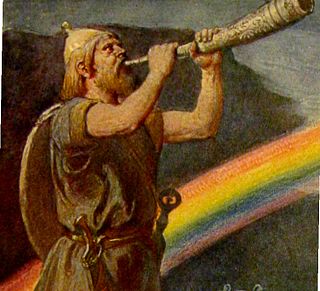
In Norse mythology, Bifröst, also called Bilröst, is a burning rainbow bridge that reaches between Midgard (Earth) and Asgard, the realm of the gods. The bridge is attested as Bilröst in the Poetic Edda; compiled in the 13th century from earlier traditional sources, and as Bifröst in the Prose Edda; written in the 13th century by Snorri Sturluson, and in the poetry of skalds. Both the Poetic Edda and the Prose Edda alternately refer to the bridge as Ásbrú.

Baldr is a god in Germanic mythology. In Norse mythology, he is a son of the god Odin and the goddess Frigg, and has numerous brothers, such as Thor and Váli. In wider Germanic mythology, the god was known in Old English as Bældæġ, and in Old High German as Balder, all ultimately stemming from the Proto-Germanic theonym *Balðraz.

Týr is a god in Germanic mythology, a valorous and powerful member of the Æsir and patron of warriors and mythological heroes. In Norse mythology, which provides most of the surviving narratives about gods among the Germanic peoples, Týr sacrifices his hand to the monstrous wolf Fenrir, who bites it off when he realizes the gods have bound him. Týr is foretold of being consumed by the similarly monstrous dog Garmr during the events of Ragnarök.

Yggdrasil is an immense and central sacred tree in Norse cosmology. Around it exists all else, including the Nine Worlds.
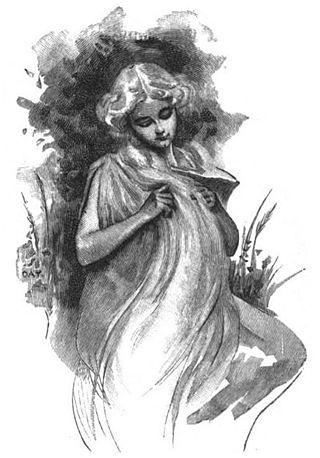
In Norse mythology, Sif is a golden-haired goddess associated with earth. Sif is attested in the Poetic Edda, compiled in the 13th century from earlier traditional sources, and the Prose Edda, written in the 13th century by Snorri Sturluson, and in the poetry of skalds. In both the Poetic Edda and the Prose Edda, she is known for her golden hair and is married to the thunder god Thor.

In Norse mythology, Auðumbla is a primeval cow. The primordial frost jötunn Ymir fed from her milk, and over the course of three days she licked away the salty rime rocks and revealed Búri, grandfather of the gods and brothers Odin, Vili and Vé. The creature is solely attested in the Prose Edda, composed in the 13th century by Icelander Snorri Sturluson. Scholars identify her as stemming from a very early stratum of Germanic mythology, and ultimately belonging to larger complex of primordial bovines or cow-associated goddesses.

Nefertem was, in Egyptian mythology, originally a lotus flower at the creation of the world, who had arisen from the primal waters. Nefertem represented both the first sunlight and the delightful smell of the Egyptian blue lotus flower, having arisen from the primal waters within an Egyptian blue water-lily, Nymphaea caerulea. Some of the titles of Nefertem were "He Who is Beautiful" and "Water-Lily of the Sun", and a version of the Book of the Dead says:
Rise like Nefertem from the blue water lily, to the nostrils of Ra, and come forth upon the horizon each day.
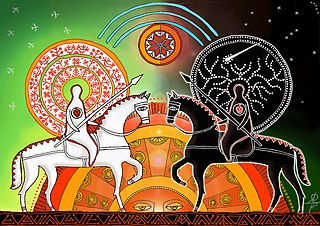
Chernobog and Belobog are an alleged pair of Polabian deities. Chernobog appears in Helmold's Chronicle as a god of misfortune worshipped by the Wagri and Obodrites, while Belobog is not mentioned – he was reconstructed in opposition to Chernobog. Both gods also appear in later sources, but they are not considered reliable. Researchers do not agree on the status of Chernobog and Belobog: many scholars recognize the authenticity of these theonyms and explain them, for example, as gods of good and evil; on the other hand, many scholars believe that they are pseudo-deities, and Chernobog may have originally meant "bad fate", and later associated with the Christian devil.
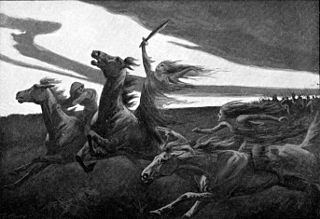
In Norse mythology, a dís is a female deity, ghost, or spirit associated with Fate who can be either benevolent or antagonistic toward mortals. Dísir may act as protective spirits of Norse clans. It is possible that their original function was that of fertility goddesses who were the object of both private and official worship called dísablót, and their veneration may derive from the worship of the spirits of the dead. The dísir, like the valkyries, norns, and vættir, are always referred collectively in surviving references. The North Germanic dísir and West Germanic Idisi are believed by some scholars to be related due to linguistic and mythological similarities, but the direct evidence of Anglo-Saxon and Continental German mythology is limited. The dísir play roles in Norse texts that resemble those of fylgjur, valkyries, and norns, so that some have suggested that dísir is a broad term including the other beings.

In Norse mythology, Óðr or Óð, sometimes anglicized as Odr or Od, is a figure associated with the major goddess Freyja. The Prose Edda and Heimskringla, written in the 13th century by Snorri Sturluson, both describe Óðr as Freyja's husband and father of her daughter Hnoss. Heimskringla adds that the couple produced another daughter, Gersemi. A number of theories have been proposed about Óðr, generally that he is a hypostasis of the deity Odin due to their similarities.

In Japanese mythology, the Seven Lucky gods or Seven gods of Fortune are believed to grant good luck and are often represented in netsuke and in artworks. One of the seven (Jurōjin) is said to be based on a historical figure.
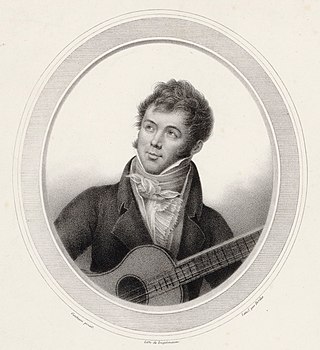
Fernando Sor was a Spanish classical guitarist and composer of the early Romantic era. Best known for writing solo classical guitar music, he also composed an opera, three symphonies, guitar duos, piano music, songs, a Mass, and at least two successful ballets: Cinderella, which received over one hundred performances, and Hercule et Omphale.

In Greek mythology, Phaon was a mythical boatman of Mytilene in Lesbos. He was old and ugly when Aphrodite came to his boat. She put on the guise of a crone. Phaon ferried her over to Asia Minor and accepted no payment for doing so. In return, she gave him a box of ointment. When he rubbed it on himself, he became young and beautiful. Many were captivated by his beauty.

In some cultures, a rabbit's foot is carried as an amulet believed to bring good luck. This belief is held by people in a great number of places around the world, including Europe, China, Africa, Australia and North and South America. In variations of this superstition, the rabbit it came from must possess certain attributes, such as having been killed in a particular place, using a particular method, or by a person possessing particular attributes.

Korean dragons are legendary creatures in Korean mythology and folklore. The appearance of the dragon reflects its relation to its East Asian counterparts, including the Chinese dragons.
Sorginak are the assistants of the goddess Mari in Basque mythology. It is also the Basque name for witches, priests and priestesses, making it difficult to distinguish between the mythological and real ones.

Sør-Frøya is a former municipality in the old Sør-Trøndelag county, Norway. The 102-square-kilometre (39 sq mi) municipality existed from 1906 until its dissolution in 1964. Sør-Frøya included the southwestern part of the island of Frøya in what is now the municipality of Frøya in Trøndelag county. The main population center of Sør-Frøya was the village of Titran on the western tip of the island. The main church for the municipality was Hallaren Church which is located in Storhallaren on the southern coast of the island.
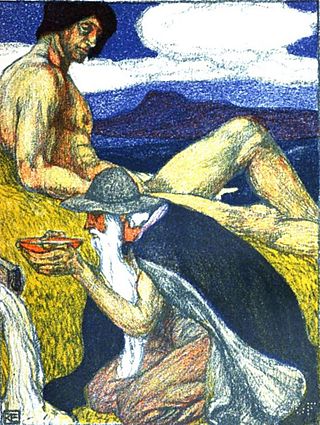
In Norse mythology, Mímisbrunnr is a well associated with the being Mímir, located beneath the world tree Yggdrasil. Mímisbrunnr is attested in the Poetic Edda, compiled in the 13th century from earlier traditional sources, and the Prose Edda, written in the 13th century by Snorri Sturluson. The well is located beneath one of three roots of the world tree Yggdrasil, a root that passes into the Jötunheimr where the primordial plane of Ginnungagap once existed. In addition, the Prose Edda relates that the water of the well contains much wisdom, and that Odin sacrificed one of his eyes to the well in exchange for a drink. In the Prose Edda, Mímisbrunnr is mentioned as one of three wells existing beneath three roots of Yggdrasil, the other two being Hvergelmir, located beneath a root in Niflheim, and Urðarbrunnr.

Aphroditus or Aphroditos was a male Aphrodite originating from Amathus on the island of Cyprus and celebrated in Athens.
References
- ↑ Jordan, Michael (2014-05-14). Dictionary of Gods and Goddesses. Infobase Publishing. ISBN 978-1-4381-0985-5.